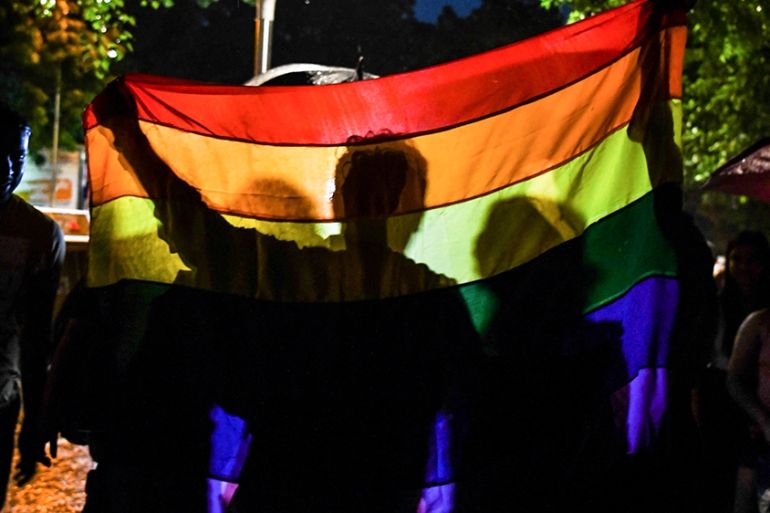Study: Anti-LGBTQ laws cost Caribbean up to $4.2BN a year
A new report by Open for Business found that Caribbean nations are losing billions of dollars in missing tourism, productivity and competitiveness each year to laws that discriminate against LGBTQ people.

Discrimination against LGBTQ people costs English-speaking Caribbean countries as much as $4.2bn a year, Open for Business (OFB), a coalition of companies advocating for LGBTQ equity, says in a report (PDF) released on Wednesday.
The research highlights what OFB has termed “the decriminalisation dividend”, said Jon Miller, partner at the Brunswick Group and founder of Open for Business.
Keep reading
list of 4 items‘No good evidence’ for gender care for youth over long-term, review finds
Vatican denounces gender-affirming surgery, gender theory and surrogacy
Fears of discrimination in Thailand despite looming same sex marriage bill
“Countries that decriminalise [same-sex acts] are creating better economic conditions,” Miller told Al Jazeera. “They’re more productive, more competitive, more entrepreneurial [and] more attractive to tourists.”
The report complements global research that suggests that countries with more inclusive societies have stronger economies and more productive workers.
The Caribbean has some of the most discriminatory laws against the LGBTQ community in the world. Sexual relations between same-sex couples is criminalised in nine of the 12 countries the report examined. And none of them allow a change of sex or gender marks on official state identification documents.
These laws, as well as social stigma and violence against LGBTQ people, affect tourism, productivity, the competitiveness of workers and businesses – and the overall economic outlook of the region, according to the study, which includes the largest-ever survey of LGBT+ issues in the Caribbean, OFB said.
Using a mixed-method approach, OFB surveyed LGBTQ people living in the 12 countries and the diaspora from those nations – as well as prospective Caribbean tourists from mostly the United States, Canada and the United Kingdom. It also interviewed 21 business leaders in the region.
OFB found that systemic discrimination and stigma leads to what researchers call LGBTQ “occupational segregation” – a condition in which one demographic group is over or underrepresented in certain jobs or fields, to the detriment of the broader economy.
“Our research shows that occupational segregation is so prevalent that it keeps LGBT+ people out of the formal sector … and this has aggregate costs,” said Phil Crehan, one of the report’s lead researchers.
Because LGBTQ people are pushed into the informal labour sector, they make less money and contribute less to the economy, Crehan told Al Jazeera.
“Even for those who make it to the formal sector, we saw that they have to be completely closeted, which has its own mental health impacts, productivity impacts [and] they can’t make it to higher-level, more visible and more well-paying positions,” he said.
This ultimately means that the “aggregated macroeconomic costs are tremendous because it is just such a complex misallocation of labour, not based on talents or skills or human capital, but rather dictated by the biases of employers”, Crehan added.
‘This is the moment’
The report, funded in part by Virgin Atlantic, also found that tourism – which accounts for 14 percent of the collective gross domestic product of the countries studied – is diminished by anti-LGBTQ laws and stigma, costing the region between $435m and $689m each year.
It also found that 18 percent of travellers surveyed would not visit the region, with the key reason being anti-LGBTQ laws and stigma. About 60 percent of those surveyed said they would visit Barbados, for example, only after its government passes legislation allowing same-sex unions.
The research can be particularly helpful as Caribbean countries seek to rebound from the economic toll of the coronavirus pandemic, OFB founder Miller said.
“Our message with this report to [the region’s political leaders] is really clear,” Miller told Al Jazeera. “This is the moment for political leaders in the Caribbean to re-energise their economies after the pandemic by shaking off these colonial laws.”
Miller added that Open for Business hopes the report can also reframe the debate over LGBTQ rights in the region.
“For far too long the debate has been basically a tug-of-war between religion on one side and human rights on the other,” Miller said. “And this data shows that it’s actually about people’s livelihoods, it’s about education, health, it’s about economic progress in the region, [and] it’s about tourism, growth and resilience.”